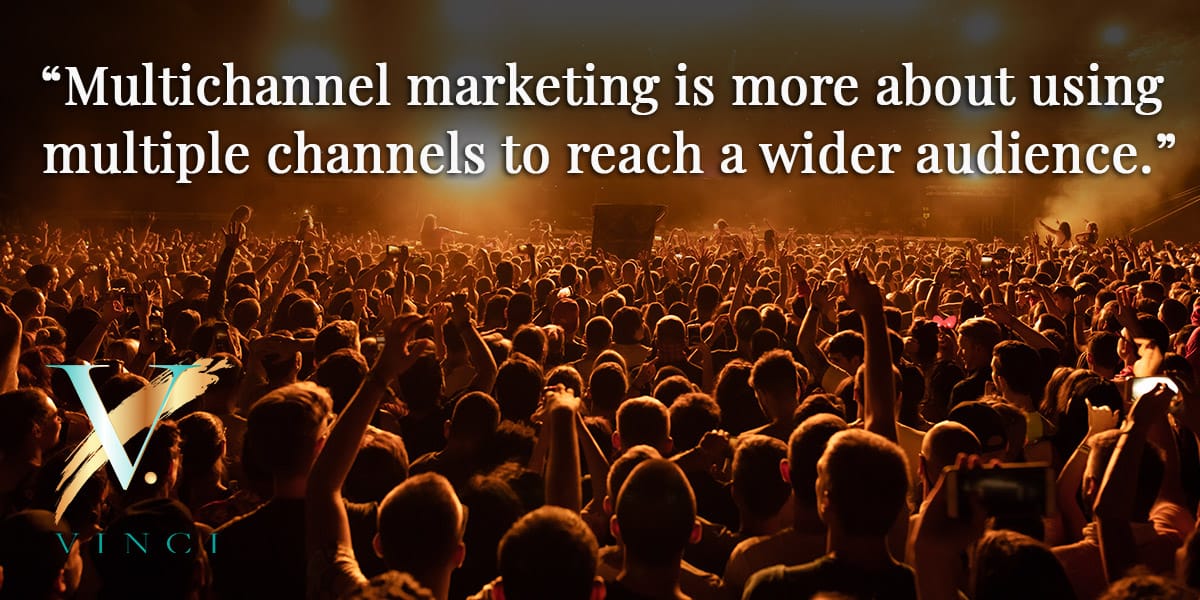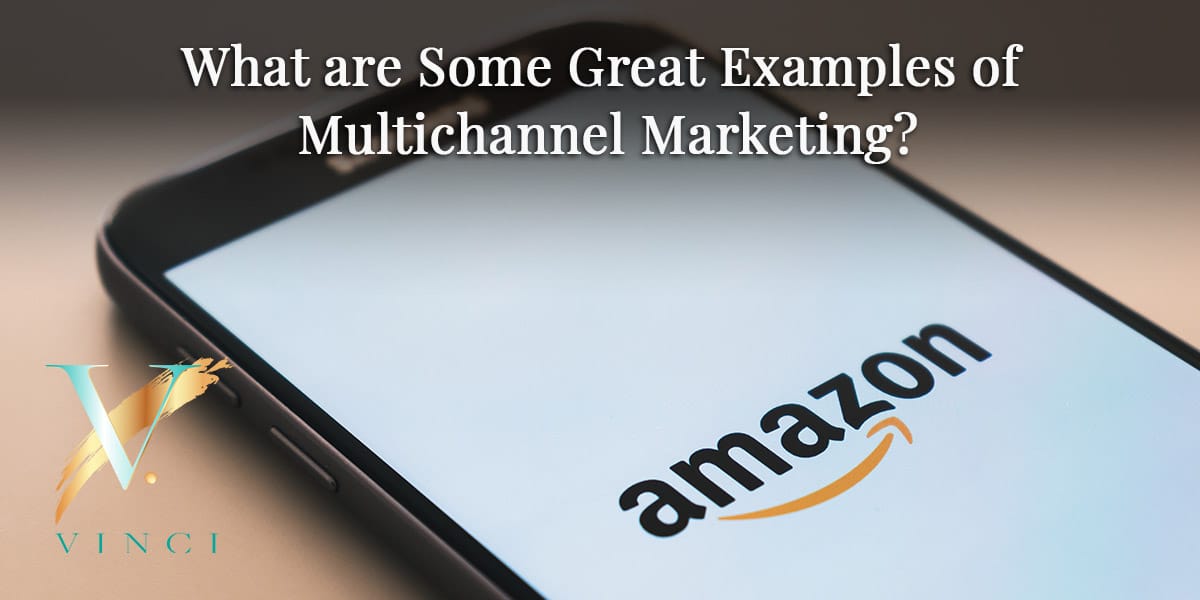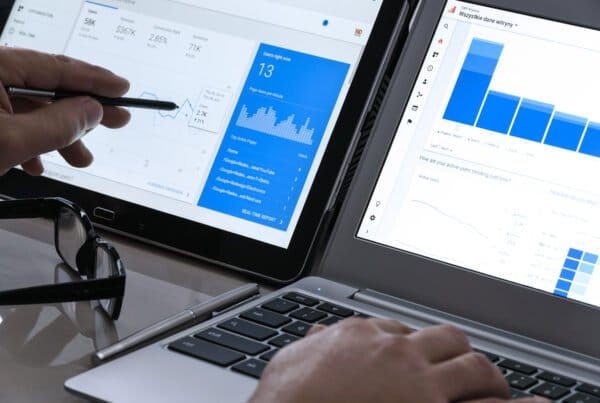Here we are in 2023, an age full of technological advances, emerging AI and a time that is considered to be THE official digital age. When it comes to marketing, it’s been crucial to jump on board the digital train but the truth is no business should ever put all their eggs in one basket. Multichannel marketing not only prevents that, but also has so many benefits to your marketing communication.
What is Multichannel Marketing?
On today’s blog we are going to be discussing multichannel marketing in 2023. Are you wondering what multichannel marketing is? We’ve got your back. multichannel marketing is a strategy that involves reaching potential customers through a variety of different channels, both online and offline. These channels can include email, social media, mobile apps, search engines, direct mail, television, radio, billboards, print and more.
Multichannel marketing aims to provide a seamless and consistent experience for the customer across all channels. By using multiple channels to reach customers, companies can increase their chances of reaching their target audience and engaging with them on multiple levels.
Multichannel marketing gives companies the opportunity to tailor their messaging and content to specific channels and audiences making it more impactful. For example, a company might use social media to reach younger audiences while using direct mail to target older customers. By using a variety of channels, companies can also gather more data about their customers and use that information to personalize their other marketing efforts.
Overall, multichannel marketing is an effective way for companies to increase their visibility while reaching a wider audience and providing a better experience.
What Are the Benefits of Multichannel Marketing?

Here are several major benefits of multichannel marketing:
- Increased visibility: By using multiple channels to reach customers, companies can increase their visibility and achieve a much wider reach. This can help to increase brand awareness and generate more leads.
- Improved customer experience: Multichannel marketing allows companies to provide a better customer experience by engaging with their audience on multiple levels and ensuring they received a tailored message. This can help to build stronger relationships with customers and improve customer satisfaction.
- Higher conversion rates: By utilizing multiple channels in the quest to reach customers, companies can increase their chances of converting leads into customers. This is because customers may respond better to different channels, and by using multiple channels, companies can increase their chances of being in the right time and in the right place.
- Greater insights into customer behavior: Multichannel marketing allows companies to gather more data about their customers, such as their preferences, behaviors, and purchase history. This data can be used to personalize themarketing efforts and improve targeting.
- Competitive advantage: By using a multichannel approach, companies can gain a competitive advantage over their competitors, who may be using a single-channel approach. This can help to differentiate the company and improve its overall market position.
How Effective Is Multichannel Marketing?

There are several statistics that also support the efficacy of multichannel marketing:
- According to a survey by Omnisend, using three or more channels in a marketing campaign can increase customer engagement by up to 287%.
- In a survey by Harvard Business Review, 73% of customers use multiple channels during their shopping journey, and companies that use multichannel marketing see an average 4% increase in customer spending.
- According to a study by DMA, multichannel marketing campaigns have a response rate that is 35% higher than single-channel campaigns.
- A study by Google found that customers who engage with a company on multiple channels have a 30% higher lifetime value than those who engage with the company on a single channel.
- In a survey by Accenture, 91% of customers said that they are more likely to shop with brands that recognize, remember, and provide relevant offers and recommendations.
We Often Hear the Term Cross-channel and Multichannel Marketing Used Interchangeably, but What is the Difference Between the Two?

Cross-channel marketing and multichannel marketing are similar in that they both involve using multiple channels to reach customers. However, there is a subtle difference between the two that is worth noting.
As we mentioned at the beginning of this article, multichannel marketing is the use of multiple channels to reach customers, but what we haven’t yet clarified is that each channel is used independently and often without any coordination between channels. For example, a company might send email campaigns to their customers while also running a TV ad campaign. The email campaign and the TV ad campaign are both part of the company’s overall marketing strategy, but they may not be coordinated with each other.
On the other hand, cross-channel marketing involves using multiple channels to create a seamless and consistent customer experience. In cross-channel marketing, the channels are used in a coordinated way to create a unified message and customer journey. For example, a company might use email, social media, and direct mail to reach customers, but the messaging and branding across all channels would be consistent and coordinated.
In other words, cross-channel marketing focuses on creating a unified customer experience across all channels, while multichannel marketing is more about using multiple channels to reach a wider audience.
What are Some Great Examples of Multichannel Marketing?

There are many great examples of multichannel marketing, but here are some of our favorites:
- Nike: uses a multichannel approach to reach customers across a variety of channels, including email, social media, television, and in-store promotions. They also offer a seamless customer experience by providing online shopping options, as well as in-store pickup and returns.
- Starbucks: uses a multichannel approach to engage with customers on social media, email, and through their mobile app. They also offer in-store promotions and discounts, and they have a rewards program that rewards customers for their loyalty.
- Amazon: uses a multichannel approach to reach customers through their website, mobile app, and through their Amazon Prime subscription service. They also offer multiple delivery options, including same-day delivery, to provide a seamless customer experience.
- Coca-Cola: uses a multichannel approach to engage with customers through their website, social media, email, and in-store promotions. They also have a mobile app that allows customers to customize their drinks and earn rewards for their purchases.
- Sephora: uses a multichannel approach to reach customers through their website, social media, email, and in-store promotions. They also offer a loyalty program that rewards customers for their purchases, and they have a mobile app that provides personalized recommendations and tutorials.
When Could Multichannel Marketing Become a Problem?

While multichannel marketing can be a very effective marketing strategy, there are some situations where it can easily become a problem. Here are some examples:
- Inconsistency across channels: If a company uses multiple channels without ensuring that the messaging and branding are consistent across those channels, it can lead to confusion and a lack of trust from customers.
- Overwhelming customers: If a company bombards customers with marketing messages across multiple channels, it can lead to irritation and a negative customer experience. This is sometimes referred to as “oversaturating the feed” and is a major turn off for consumers.
- Lack of coordination between channels: If a company uses multiple channels without coordinating them, it can lead to a disjointed customer journey and a lack of focus in the overall marketing strategy.
- Inability to measure the effectiveness of each channel: If a company uses multiple channels without tracking and analyzing the effectiveness of each channel, it can be difficult to determine which channels are most effective and where to allocate resources.
- Neglecting certain channels: If a company focuses too heavily on certain channels and neglects others, it can lead to missed opportunities and a lack of reach to potential customers.
Overall, multichannel marketing can become a problem if it is not executed properly. Companies must ensure that their messaging and branding are consistent across all channels, that they coordinate their efforts, and that they track and analyze the effectiveness of each channel.
What Are Some Examples of Multichannel Marketing Gone Wrong?

We just talked about some of the problems that can occur with multichannel marketing but what happens when these problems aren’t addressed? Here are some examples of when an issue with multichannel marketing quickly spiraled into a larger problem:
- Lack of consistency: In 2013, JC Penney underwent a rebranding effort that included a new logo and messaging. However, the new messaging was not consistent across all channels, and the rebranding was poorly received by customers. Sales declined, and the CEO was ultimately fired.
- Overwhelming customers: In 2018, Snapchat launched a redesign that was not well received by users. The redesign included an algorithm that showed content from friends and celebrities in the same feed, making it difficult for users to find the content they were looking for. The redesign led to a drop in user engagement and a loss of revenue.
- Lack of coordination: In 2017, Pepsi launched an ad campaign featuring Kendall Jenner that was criticized for being tone-deaf and insensitive. The ad showed Jenner joining a protest and giving a can of Pepsi to a police officer, which was seen as trivializing real-life protests and social justice issues. The ad was poorly received, and Pepsi was forced to pull it from the airwaves.
- Neglecting certain channels: In 2013, Blackberry launched a new smartphone called the Z10 that was aimed at the consumer market. However, the company neglected to invest in marketing efforts for the device, and it was not well received by customers. Sales were poor, and the company ultimately decided to exit the consumer market altogether.
Thinking About Getting Started with Multichannel Marketing? Here Are Some of Our Best Tips!

- Tailor your messaging and content to the right people and then right channels. Who must always come before the where. You can’t pick an avenue and simply hope that is where your audience will be. Focus on them first and tailor your messaging and channel selection accordingly.
- Choose the right channels: Consider which channels are most relevant to your target audience and which ones will help you achieve your marketing goals. Focus on the channels that are most likely to reach your audience and help you achieve your objectives.
- Ensure consistency across channels: It’s important to maintain consistency in your messaging and branding across all channels. This will help to build trust with your audience and create a seamless customer experience.
- Coordinate your efforts: Coordinate your marketing efforts across all channels to ensure a consistent message and customer experience. This will help to avoid confusion and prevent disjointed campaigns.
- Track and measure your results: It’s important to track and measure the effectiveness of each channel in your multichannel campaign. This will help you identify which channels are most effective and where to allocate your resources for the best results.
- Be agile and flexible: Multichannel marketing is an iterative process, so be prepared to adjust your strategy based on the results you achieve. Be open to trying new things and adapting to changing trends and customer preferences.
In conclusion, multichannel marketing is an effective way to reach customers on multiple levels and provide a seamless customer experience across multiple channels. By using a multichannel approach, companies can increase their visibility, improve customer experience, and boost their overall marketing performance.
If you’re interested in learning more about how a multichannel marketing strategy can benefit your business, schedule a strategy call with our team today. We’ll work with you to understand your unique business needs and goals and create a customized multichannel marketing plan that delivers results. Don’t miss out on the opportunity to take your marketing efforts to the next level with a powerful multichannel approach.











